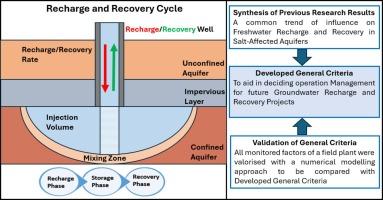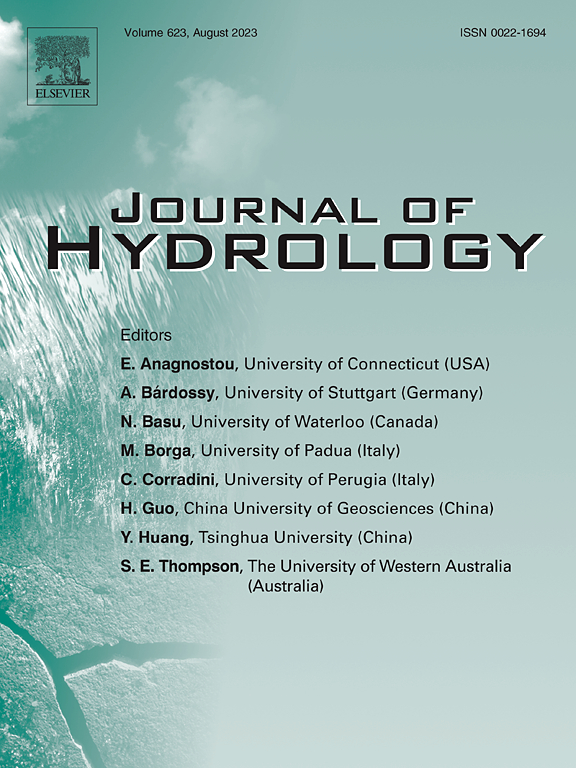Synthesis of research findings and general criteria for sustainable groundwater recharge and recovery in saline aquifers
IF 5.9
1区 地球科学
Q1 ENGINEERING, CIVIL
引用次数: 0
Abstract
Managed Aquifer Recharge (MAR), a reliable technique for groundwater restoration in arid regions, struggles with the limited recovery of stored water in salt-affected areas due to fresh-saline water mixing. Groundwater recharge and recovery project performance in saline aquifers is primarily controlled by operational factors because it influences fresh-saline water mixing significantly. Understanding the impact of operational factors is thus crucial for optimizing MAR performance, particularly in saline groundwater regions. This study conducted a comprehensive literature review of literature studies related to MAR in Salt-affected groundwater regions (MARS), along with statistical analysis to discuss each operational factor’s common positive or negative effects on aquifer recharge and recovery performance. The Recovery Efficiency (RE) values in each MARS study analyzed in this article are influenced by unique hydrogeological and operational settings, resulting in significant variations. However, a similar influencing trend of each operational factor on the observed RE variation is found. To validate the results of this analysis, a variable density groundwater flow model was developed from the data of a MAR field application project given in Reese (2002) and simulated for similar variations in operational factors. The simulation results corroborated the general trends observed in the review analysis. This study provides a comprehensive analysis of how operational factors influence the RE of MARS. The results demonstrate that a higher recharge rate, larger freshwater volume, smaller storage durations, and a minimum of four subsequent recharge-recovery cycles may lead to higher RE. The trends obtained for each operational factor can be utilized to optimize the operation of MARS projects for achieving higher RE in the salt-affected regions of the world.

含盐含水层可持续地下水补给和恢复的研究成果和一般标准综述
含盐蓄水层管理补给(MAR)是干旱地区地下水恢复的一项可靠技术,但由于淡盐水混合,受盐影响地区的储水恢复有限。含盐含水层的地下水补给和恢复项目的绩效主要受运行因素控制,因为它对淡盐水混合有很大影响。因此,了解运行因素的影响对于优化地下水补给与恢复工程的性能至关重要,尤其是在盐碱地下水区域。本研究对受盐分影响的地下水区域(MARS)有关 MAR 的文献研究进行了全面的文献综述,并进行了统计分析,以讨论每个运行因素对含水层补给和恢复性能的常见积极或消极影响。本文分析的每项 MARS 研究中的回收效率(RE)值都受到独特的水文地质和运行环境的影响,因此差异很大。不过,每个运行因素对观测到的 RE 变化都有类似的影响趋势。为了验证这一分析结果,根据 Reese(2002 年)提供的一个 MAR 实地应用项目的数据开发了一个可变密度地下水流模型,并对类似的运行因素变化进行了模拟。模拟结果证实了审查分析中观察到的总体趋势。这项研究全面分析了运行因素如何影响 MARS 的可再生能源。结果表明,较高的补给率、较大的淡水量、较短的贮存时间以及至少四个后续补给-恢复周期可导致较高的可再生能源利用率。可以利用每个运行因素的趋势来优化 MARS 项目的运行,从而在世界受盐影响地区实现更高的可再生能源。
本文章由计算机程序翻译,如有差异,请以英文原文为准。
求助全文
约1分钟内获得全文
求助全文
来源期刊

Journal of Hydrology
地学-地球科学综合
CiteScore
11.00
自引率
12.50%
发文量
1309
审稿时长
7.5 months
期刊介绍:
The Journal of Hydrology publishes original research papers and comprehensive reviews in all the subfields of the hydrological sciences including water based management and policy issues that impact on economics and society. These comprise, but are not limited to the physical, chemical, biogeochemical, stochastic and systems aspects of surface and groundwater hydrology, hydrometeorology and hydrogeology. Relevant topics incorporating the insights and methodologies of disciplines such as climatology, water resource systems, hydraulics, agrohydrology, geomorphology, soil science, instrumentation and remote sensing, civil and environmental engineering are included. Social science perspectives on hydrological problems such as resource and ecological economics, environmental sociology, psychology and behavioural science, management and policy analysis are also invited. Multi-and interdisciplinary analyses of hydrological problems are within scope. The science published in the Journal of Hydrology is relevant to catchment scales rather than exclusively to a local scale or site.
 求助内容:
求助内容: 应助结果提醒方式:
应助结果提醒方式:


